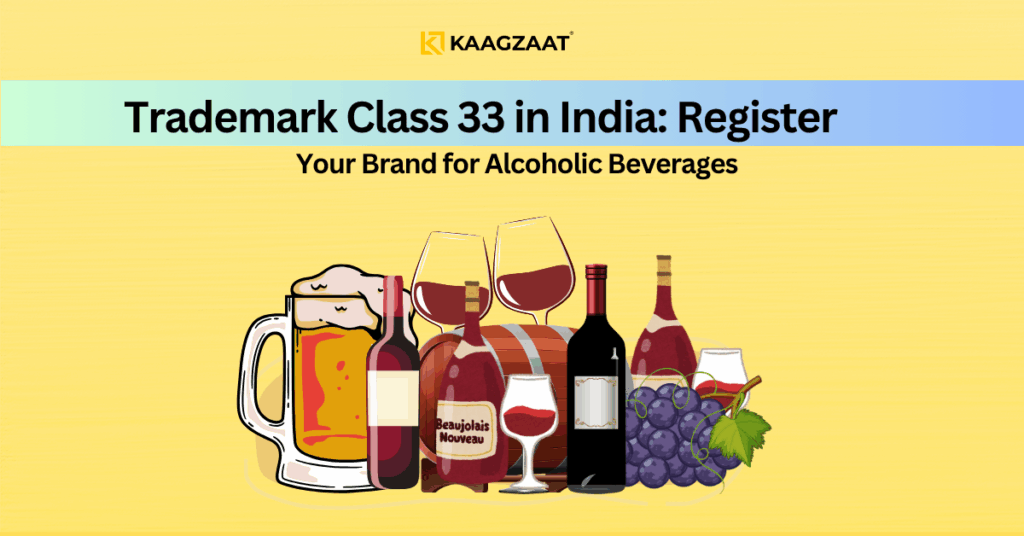Trademark Class 33 in India: Register Your Brand for Alcoholic Beverages

India’s alcoholic beverage industry is evolving rapidly, with more businesses launching, innovating, and competing in the legal, retail, and hospitality sector. If your brand operates in spirits, wine, cocktails, or any form of distilled alcohol, Trademark Class 33 governs your intellectual property rights.
What is Trademark Class 33?
Trademark Class 33, under the international Nice Classification and Indian trademark law, covers:
- Alcoholic beverages (except beer)
- Spirits, wine, liqueurs, cider, aperitifs, and pre-mixed alcohol drinks
- Alcoholic preparations used for making drinks
Beer and medicinal beverages are not covered (see Class 32 for beer; Class 5 for medicinal drinks).
Comprehensive List: Goods in Trademark Class 33
| Category | Examples |
|---|---|
| Spirits/Liquor | Whisky, gin, rum, vodka, tequila, brandy, cognac, arrack |
| Wines | Red, white, rosé, sparkling wines, fortified wines, port |
| Liqueurs | Baileys, Kahlua, Amarula, anise liqueur, peppermint liqueur |
| Cider, Perry | Apple cider, pear cider |
| Pre-Mixed Drinks | Ready-to-serve cocktails, premixed RTD (ready-to-drink) |
| Aperitifs, Bitters | Campari, vermouth, bitters, digestifs |
| Rice alcohol | Sake (Japanese), Nira (Indian sugarcane-based) |
| Alcoholic syrups | Alcoholic flavour extracts for mixing |
| Mead/Hydromel | Traditional honey-based alcoholic drinks |
What’s Excluded from Class 33?
- Beer and non-alcoholic beer (Class 32)
- De-alcoholized beverages`
- Beverages with medicinal or therapeutic use (Class 5).
Why Register Under Trademark Class 33?
- Brand Protection
Alcohol industry counterfeiting, imitation, and parallel imports are rampant trademark registration gives you legal exclusivity and enforcement power.
- Market Compliance & Expansion
Retail chains, distributors, and international markets require trademark evidence. Major Indian spirits and wine exporters rely heavily on robust IP protection.
- Consumer Trust & Franchise Growth
A registered trademark assures authenticity, supports franchise/brand licensing, and is often needed for digital/e-commerce partners.
Step-by-Step: How to Register in Class 33 (India)
- Trademark Search
- Start with a trademark search on the IP India portal to check availability and avoid conflicts.
- Application Preparation
- Collect all documentation: brand/logo artwork, applicant details, precise product list (“whisky, rum, vodka, red wine,” etc.).
- Decide: word mark (brand name), device mark (logo), or both.
- File Your Application
- Apply online at IP India or through a legal expert .
- Select Class 33 and mention all alcoholic beverages your brand covers.
- Examination & Objection Reply
- Registry examines for conflicts. If objections arise, respond professionally.
- Publication & Opposition
- Mark is published for 4 months for public scrutiny/opposition.
- Certificate & Renewal
- On clearance, receive a registration certificate—protects for 10 years, trademark renewable.
Top Indian and Global Brands Registered in Class 33
| Brand/Producer | Flagship Product |
|---|---|
| Sula Vineyards | Sula (red, white, sparkling wines)8 |
| Old Monk | Rum9 |
| Royal Stag, Imperial Blue | Whisky |
| Officer’s Choice | Whisky |
| Bacardi | Rum |
| Johnnie Walker | Whisky |
| Smirnoff | Vodka |
| Campari | Aperitif, bitters |
| Jägermeister | Herbal liqueur |
These brands depend on robust Class 33 protection for global and Indian market leadership.
Distinction: Trademark Class 33 vs Related Classes
| Feature/Product | Class 33 | Other Relevant Class |
|---|---|---|
| Alcoholic spirits, wines | ✔ | |
| Beer | 32 | |
| Liqueurs, aperitifs, mead | ✔ | |
| Medicinal oxy tinctures | 5 | |
| Alcoholic flavour syrups | ✔ | |
| Alcohol-free “mocktails” | 32 |
Who Should Register in Class 33?
- Distilleries, wineries, breweries (non-beer alcoholic drinks)
- Corporates and startups launching spirits or wines
- RTD (Ready-to-Drink) and cocktail brands
- Fruit wine, mead, sake, and local/heritage liquor producers
- Distributors, importers, and exporters of alcoholic beverages
Best Practices and Legal Tips
- Be Exact and Thorough: List all variants and product formats (“gin, rum, sparkling wine, ready-to-serve cocktails”).
- Choose Strong, Distinct Names: Avoid generic phrases (e.g., “Indian Rum”).
- Monitor for Infringement: Use ongoing trademark search to detect misuse, especially with similar sounding/looking marks.
- Defend Your Mark: Timely renewal and opposition are essential for long-term security.
- Expand Internationally: If you export, use the Madrid Protocol for global brand protection.
- Consult Legal Experts: Leverage professional services (online legal services) for smooth application and defense.
Conclusion
For Indian alcoholic beverage brands whether you’re a heritage distiller, innovative startup, or major winemaker Trademark Class 33 is your essential legal shield. It grants market exclusivity, fosters consumer trust, and enables confident expansion offline and online. Ensure your brand’s future by starting with a trademark search, proceeding to trademark registration, and leveraging seamless online legal services at Kaagzaat.
Trademark Search India: The Ultimate 2026 Guide to Securing Your Brand Name
How To Start Dropshipping With Roposo Clout in India
Trademark Trends in the Metaverse: NFTs, Virtual Goods, and IP
Top 100 Business Ideas In India
Legal Age of Marriage in India (2025): A Clear & Updated Guide
How to Get ESIC Insurance Number in India (2025): Complete Guide
Section 142(1) Income Tax Notice: Meaning, Key Points, Documents & Reply Format
Revised TDS Return Filing in India (2025): Step-by-Step Guide
GST on Gold in India: Updated Rates for Jewellery, Coins, Bars & Biscuits
How to Verify FSSAI License Number Online in 2025: Step-by-Step Guide
